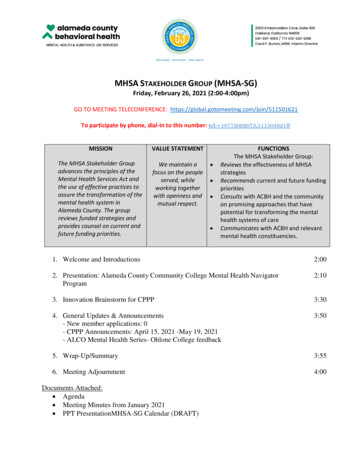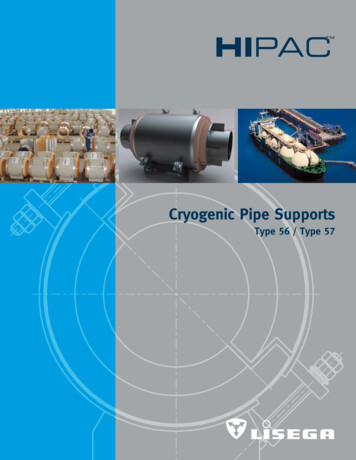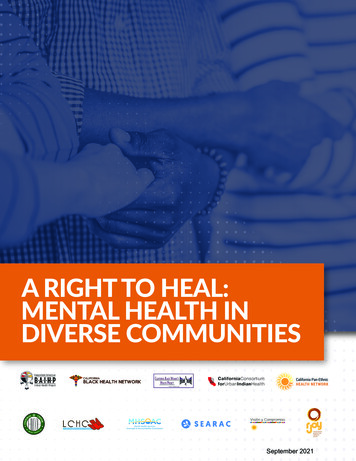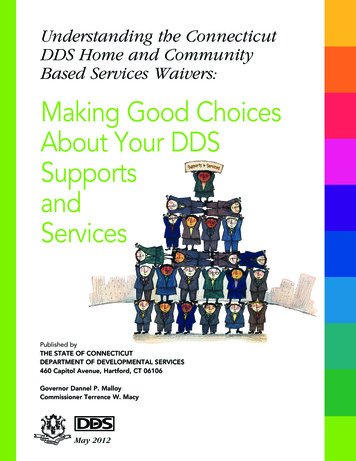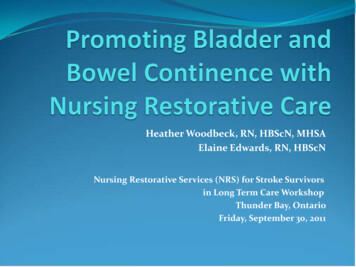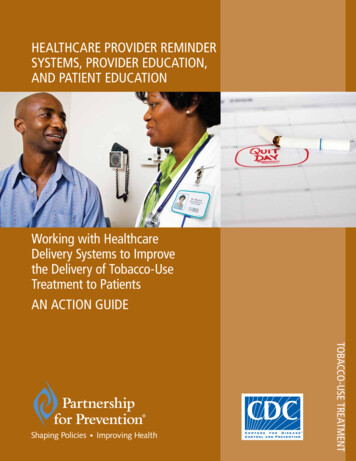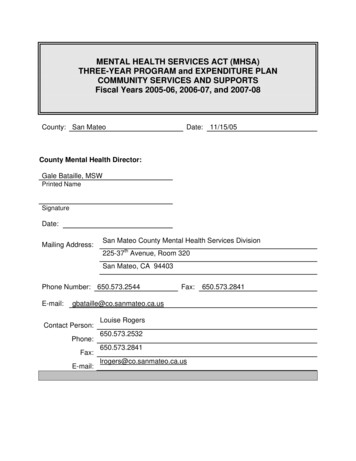
Transcription
MENTAL HEALTH SERVICES ACT (MHSA)THREE-YEAR PROGRAM and EXPENDITURE PLANCOMMUNITY SERVICES AND SUPPORTSFiscal Years 2005-06, 2006-07, and 2007-08County: San MateoDate: 11/15/05County Mental Health Director:Gale Bataille, MSWPrinted NameSignatureDate:San Mateo County Mental Health Services DivisionMailing Address:225-37th Avenue, Room 320PPSan Mateo, CA 94403Phone Number: 0.573.2532Phone:E-mail:UTLouise RogersContact usTUUT650.573.2841
TABLE OF CONTENTSEXECUTIVE SUMMARY . 1TUUTPART I: COUNTY / COMMUNITY PLANNING PROCESS & PLAN REVIEW. 10TUUTSECTION 1:1.11.21.31.4SECTION 2:PLANNING PROCESS . 10DESCRIPTION OF LOCAL PUBLIC PLANNING PROCESS . 10DESCRIPTION OF HOW THE PROCESS WAS COMPREHENSIVE & REPRESENTATIVE14PLANNING PROCESS LEADERSHIP & PLANNING . 16DESCRIPTION OF TRAINING PROVIDED TO STAKEHOLDERS . 16PLAN REVIEW . 20TUUTTUUTTUTUUTTUTUUTTUUTUTUTTUUTTUTUUTUTPART II: PROGRAM AND EXPENDITURE PLAN . 21TUUTSECTION 1: IDENTIFYING COMMUNITY ISSUES RELATED TO MENTAL ILLNESS & RESULTINGFROM LACK OF COMMUNITY SERVICES AND SUPPORTS . 211.1MAJOR COMMUNITY ISSUES . 211.2DESCRIPTION OF CRITERIA USED TO IDENTIFY ISSUES AND PROCESS FORPRIORITIZING . 211.3DESCRIPTION OF ETHNIC & CULTURAL DISPARITIES WITHIN EACH SELECTED ISSUEBY AGE GROUP . 601.4RATIONALE FOR SELECTING ANY ISSUES NOT IDENTIFIED BY MHSA . 68SECTION 2: ANALYZING MENTAL HEALTH SERVICES NEEDS IN THE COMMUNITY . 692.1NARRATIVE ANALYSIS OF UN-SERVED POPULATIONS BY AGE GROUP . 692.2ANALYSIS OF FY 03/034 MENTAL HEALTH SERVICES DIVISION UTILIZATION DATA:THOSE CURRENTLY FULLY SERVED OR UNDER/INAPPROPRIATELY SERVED . 752.3DESCRIPTION OF UNDER-SERVED AND INAPPROPRIATELY SERVED POPULATIONSBY AGE GROUP AND ETHNIC DISPARITIES . 822.4OBJECTIVES RELATED TO THE NEED FOR AND PROVISION OF CULTURALLY ANDLINGUISTICALLY COMPETENT SERVICES. 84SECTION 3: IDENTIFYING INITIAL POPULATIONS FOR FULL SERVICE PARTNERSHIPS . 863.1IDENTIFICATION OF POPULATIONS FOR FULL SERVICE PARTNERSHIPS . 883.2DESCRIPTION OF CRITERIA LEADING TO SELECTION OF POPULATIONS . 893.3DESCRIPTION OF HOW SELECTION OF INITIAL POPULATIONS WILL REDUCE ETHNICDISPARITIES . 90SECTION 4: IDENTIFYING PROGRAM STRATEGIES . 92SECTION 5: ASSESSING CAPACITY . 985.1ANALYSIS OF STRENGTHS AND LIMITATIONS OF CAPACITY TO MEET THE NEEDS OFRACIALLY AND ETHNICALLY DIVERSE POPULATIONS . 985.2ASSESSMENT OF PERCENTAGES OF PROVIDERS COMPARED TO THOSE NEEDINGSERVICES AND TOTAL COUNTY POPULATION . 1005.3DISCUSSION OF BARRIERS IN IMPLEMENTATION . 104SECTION 6: DEVELOPING WORK PLANS, TIMEFRAMES AND BUDGETS/STAFFING . 1066.1SUMMARY INFORMATION ON PROGRAMS TO BE DEVELOPED OR EXPANDED . TUUTUTTU11/15/2005 For questions regarding this document, please contact Louise Rogers at (650) 573-2532 orlrogers@co.sanmateo.ca.usUT
San Mateo County Mental Health Services DivisionMHSA Three-Year Program and Expenditure Community Services and Supports Plan6.2TUPROGRAMS TO BE DEVELOPED OR EXPANDED . 1071. Full Service Partnership, Child/Youth/Transition Age Youth . 1072. Full Service Partnership, Adults . 1143. Full Service Partnership, Older Adults (and Medically Fragile Transition Age Adults) . 1204. Community Outreach and Engagement . 1255. School Based Services . 1336. Pathways—Court Mental Health Program . 1377. Older Adult System of Care Development . 1438. System Transformation . 147Summary . 154UTTUUTTUUTTUUTTUUTTUUTTUUTTUUTTUUTTUTUUTUTPART III: REQUIRED EXHIBITSExhibit 1Exhibit 2Exhibit 3Exhibit 4Exhibit 5Exhibit 6Plan Face Sheet (see first page of Plan)County Program Work Plan ListingFull Service Partnership PopulationWork Plan SummariesBudget and Staffing Detail WorksheetsQuarterly Progress ReportsPage ii11/15/2005 For questions regarding this document, please contact Louise Rogers at (650) 573-2532 orlrogers@co.sanmateo.ca.us
San Mateo County Mental Health Services DivisionMHSA Three-Year Program and Expenditure Community Services and Supports PlanEXECUTIVE SUMMARYSan Mateo County’s proposed Mental Health Services Act (MHSA) Three-Year Program and ExpenditureCommunity Services and Supports Plan is grounded in the vision and ideas of hundreds of stakeholderswho participated in the MHSA planning process as well as the results of a community outreach process thatinvolved over one thousand community members.The San Mateo County Mental Health Services Division’s mission provides a foundation:To provide public mental health services that promote wellness, resilience and equityand support individuals with emotional disturbance/mental illness to achieve their potentialand live as contributing and successful members of their families and communities.Transformation: Kathryn Powers, Director of the Federal Center for Mental Health Services, provided themantra for San Mateo County’s MHSA planning process.TRANSFORMATION VISION BELIEF (VALUES) ACTIONx CONTINUOUS QUALITY IMPROVEMENT2PPSan Mateo County’s Plan embraces this vision of positive system transformation as well as the essentialelements of the Mental Health Services Act: community collaboration; cultural competence; client/familydriven mental health system; wellness/recovery and resilience focus; self-directed care; and integratedservices.Outcomes: San Mateo County’s Plan will make a difference for seriously emotionally disturbed childrenand youth, and seriously mentally ill adults and older adults and their families. We believe that San MateoCounty’s recent planning process has the potential to fuel system reform that reaches far beyond theprograms directly funded through the 4.9 million that is our annual MHSA budget. Among the anticipatedoutcomes resulting from San Mateo County’s transformation: Equity and access for un-served populations through culturally sensitive and effective services Meaningful use of time and capabilities (school, work, and social and community activities) Reduced homelessness and increased access to safe and adequate permanent housing A network of supportive relationships Timely access to needed help, including times of crisis Reduction in incarceration in jails and juvenile halls Reduction in involuntary services and institutionalization, and fewer out-of-home placementsPage 111/15/2005 For questions regarding this document, please contact Louise Rogers at (650) 573-2532 orlrogers@co.sanmateo.ca.us
San Mateo County Mental Health Services DivisionMHSA Three-Year Program and Expenditure Community Services and Supports PlanProgram StrategiesSan Mateo County’s proposed Plan contains eight program strategies. MHSA planning participants underthe leadership of the Mental Health Board and a Steering Committee had the difficult task of prioritizingthese from among many worthwhile strategies, but there was strong support for the balance of strategiescontained in the proposed Plan.These eight program strategies fall into the three broad approaches that are summarized in Exhibit 4 anddescribed in detail in Part II, Section 6 of the full Plan. These three broad approaches include: Outreach and Engagement Strategies, which will increase access to services for historicallyunder-served populations and communities; and System Transformation Strategies, which will increase the cultural competence of the system,expand its use of evidence-based practices, and expand its capacity to utilize peers, familymembers, and consumers as providers of services; and Full Service Partnerships, which will use over 50% of the MHSA funding and provide intensivesupport for populations most in need of comprehensive services available 24/7.Program strategies target engagement of un-served/under-served seriously emotionally disturbed (SED)children, adolescents, and transition age youth and seriously mentally ill (SMI) adults and older adults,including those with co-occurring alcohol and other drug and/or medical conditions. Increased equity inaccess and engagement, the reduction of disparities in access and engagement of ethnic/racial/linguisticand geographically under-served communities is a consistent focus across program strategies. Other areasof focus that are consistent across the program strategies are: peers and parent partners as integralmembers of the service delivery system, co-occurring disorders addressed wherever consumers areserved, cultural competence throughout the system, and housing as a component of each of the FullService Partnerships. It should be acknowledged that these MHSA initiatives build on existing strongagency and community partnerships including health and human services agencies, substance abuseproviders, criminal justice, aging and older adult services, homelessness and housing developmentorganizations, schools and community colleges, mental health providers, private philanthropicorganizations and a network of city and County social support services.Full Service Partnerships (FSPs)FSP’s provide intensive support and treatment to individuals with the highest level of mental healthneed/risk. They have a high staff to client ratio and offer seven days per week/24-hour per day support.Highly individualized and flexible services provide “whatever it takes” to support individuals in thecommunity.1. Full Service Partnership, Children/Youth/Transition Age YouthThis program will help our highest risk children and youth with serious emotional disorders remain intheir communities, with their families or caregivers while attending school and reducing involvement injuvenile justice and child welfare. This program will also provide specialized services to transition ageyouth (TAY) aged 16 to 25 with serious emotional disorders to assist them to remain in or return to theircommunities in safe environments, support positive emancipation including transition from foster careand juvenile justice, secure safe and stable housing and achieve education and employment goals.The program will be open to all youth meeting the criteria described above, but targeted toPage 211/15/2005 For questions regarding this document, please contact Louise Rogers at (650) 573-2532 orlrogers@co.sanmateo.ca.us
San Mateo County Mental Health Services DivisionMHSA Three-Year Program and Expenditure Community Services and Supports PlanAsian/Pacific Islander, Latino and African American children/youth/transition age youth as they areover-represented within school drop out, child welfare and juvenile justice populations. Asian/PacificIslander and Latino populations are under-represented in our current mental health service population.Each FSP team will have specific population-focused expertise and services; however, supervision ofboth teams by a single person will assure collaboration between teams so that youth members are ableto access age/development appropriate services and programs as they age and their individual needschange. Each FSP team will provide essential continuity in relationships while assuring access tospecialized services (such as trauma-focused, gender or sexual-orientation focused treatment andsupport) across teams.FSP, Children/Youth/Transition Age Youth(80 contracted slots)This FSP program contains two 40-slot teams:one for Children/Youth, one for TAY, staffed toreflect the diversity of those populations. Theprogram will use a Wrap Around approachincluding 24/7 response, high staff to clientratios for intensive mental health services,linkage to housing, supported education, AODtreatment and skills based interventions, parentpartners and peer supports including a drop-incenter.Staff:1.0 FTE Supervising Mental Health Clinician1.0 FTE Mental Health Program Specialist2.0 FTE Mental Health Counselors4.25 FTE Mental Health Clinicians, certified orskilled in AOD assessment and treatment2.37 FTE Parent/Caregiver Partner (CommunityWorker)0.5 FTE PsychiatristDrop-in Center:1.5 FTE Community Workers1.5 FTE Work Study Peer PartnersSupported Education:1.25 FTE Mental Health Counselors admin support, housing, flex funds andvehicles2. Full Service Partnership, AdultsThis FSP for seriously mentally ill and dually diagnosed adults is based on effective practices of theAB2034 Program and national models of assertive community treatment. The program will offer a 1:10staff ratio, intensive, field-based mental health services and “whatever it takes” to divert from thecriminal justice system and/or acute and long term institutional levels of care (locked facilities). Therewill be peer support, housing subsidies, and linkage to supported education, supported employmentand other resources. Seriously mentally ill and dually diagnosed individuals to be served by thepartnership include: 1) those eligible for diversion from criminal justice incarceration if adequate multiagency community supports can be provided; 2) currently incarcerated individuals for whom earlydischarge planning and post-release partnership structure and support may prevent recidivism and/orre-hospitalization; 3) individuals placed in locked mental health facilities who can succeed in thecommunity with intensive supports; and 4) individuals whose mental illness results in frequentemergency room visits, hospitalizations, and homelessness that puts them at risk of criminal justice orinstitutional placement. The program will focus on engagement of Latino, African American and PacificIslander populations that are over-represented in the criminal justice system and under-represented inthe mental health system.Page 311/15/2005 For questions regarding this document, please contact Louise Rogers at (650) 573-2532 orlrogers@co.sanmateo.ca.us
San Mateo County Mental Health Services DivisionMHSA Three-Year Program and Expenditure Community Services and Supports PlanFSP, Adults(55 contracted slots)There will be mental health treatment andservice coordination including integratedservices for co-occurring AOD, peer support,housing support and subsidies, and linkage tosupported education, supported employment,health care and access to community activitiesand resources.Staff:1.0 FTE Supervisor (Mental Health ProgramSpecialist)0.5 FTE Psychiatrist1.0 FTE Nurse2.0 FTE Mental Health Clinicians1.0 FTE Peer Partner (Community Worker)0.5 FTE Vocational Counselor admin support, housing, flex funds and vehicles3. Full Service Partnership, Older Adults (and Medically Fragile Transition Age Adults)The Full Service Partnership for Older Adults will offer intensive 24/7, field-based and in-home mentalhealth services and supports for older adults and ‘transition age’ adults that are seriously mentally ill,are currently or at risk of being institutionalized, and could live in a community setting with moreintensive supports. These older adults and transition age adults have a high rate of co-occurringmedical conditions that exacerbate or impact their ability to remain in home/community environments.The program will particularly seek to serve Latino, Asian and Pacific Islander individuals as thesepopulations are under-represented in the current mental health service population.FSP, Older Adults/Medically FragileTransition Age Adults(60 contracted slots)The program will include integrated treatmentand service coordination, peer counseling andsupport, housing subsidies, an emergencyshelter bed, dedicated board and care respitebed as well as physical health care support.Staff:1.0 FTE Supervisor (Mental Health ProgramSpecialist)0.5 FTE Psychiatrist1.0 FTE Nurse2.0 FTE Mental Health Clinicians1.0 FTE Peer or Family/Caregiver Partner(Community Worker) admin support, housing, flex funds and vehiclesOutreach and Engagement4. Community Outreach and EngagementThe goal is to identify and engage individuals that are currently un-served and need mental healthservices. This program will build bridges with ethnic and linguistic populations that experience healthdisparities and may experience mental health services as unresponsive to their needs. Strategiesinclude population-based community needs assessment, planning and materials development as wellas hiring of community based “navigators” and primary care based services to identify and engagediverse populations in services. Community Workers will build relationships with neighborhood andcultural leaders to ensure that under-served communities are more aware of the availability of mentalhealth services and so that these leaders and their communities can have more consistent input abouthow their communities are served.Page 411/15/2005 For questions regarding this document, please contact Louise Rogers at (650) 573-2532 orlrogers@co.sanmateo.ca.us
San Mateo County Mental Health Services DivisionMHSA Three-Year Program and Expenditure Community Services and Supports PlanNavigator Program--Bilingual/biculturalcommunity-based “navigators”, contractedoutreach workers, will collaborate with healthoutreach programs, community services andresources including the faith community.Outreach to Latino, Filipino, Chinese, PacificIslander and African American populations of allages with emphasis on specific communities indifferent parts of the County. Navigators may bepeers or parent partners, but must be bilingual,bicultural and connected to the community.Staff:1.0 FTE Community Worker, Asian/Latinofocused in northern region1.0 FTE Community Worker, Latino/AfricanAmerican/Pacific Islander focused in southernregion0.5 FTE Community Worker, Latino focused onCoast admin support and vehiclesCultural Disparity Grants--Develop three yeargrant processes for capacity building in Filipino,Chinese, Pacific Islander and African Americancommunities (building on existing Latino Accessinitiative): outreach, planning process/needsassessment, pilot projects, materialsdevelopment, human resources development,networking and training for improved mentalhealth resources and response to thesecommunities.Various contractsExpand County-operated primary careinterface team for children/youth in tworegional primary care clinics with pediatricpopulations to provide consultation, assessment,and brief treatment in northern and southernregions, with the possibility of providing servicesto the Coastside region.Create County-operated field-based primarycare consultation, assessment, brieftreatment team targeting SMI older adultclients of primary care providers serving Latino,African American, Asian populations in northernand southern regions.Staff:2.0 FTE bilingual/bicultural Mental HeathClinicians (one Asian, one Latino)1.0 FTE Child Psychiatrist admin supportImprove linkage to mental health servicesfollowing crises by adding a licensed mentalhealth clinician to the existing 24-hour crisishotline operated by Youth and FamilyEnrichment Services during peak hours so thereis enhanced ability to respond in the communityto urgent situations and link that service toStaff:1.0 FTE licensed Mental Health Clinician admin support1.0 FTE bilingual/bicultural Asian/Latino/orAfrican American Mental Health Clinician0.5 FTE Psychiatrist0.5 FTE Nurse admin support and vehiclePage 511/15/2005 For questions regarding this document, please contact Louise Rogers at (650) 573-2532 orlrogers@co.sanmateo.ca.us
San Mateo County Mental Health Services DivisionMHSA Three-Year Program and Expenditure Community Services and Supports Planexisting Community Response Team for addedsupport during major community events.System Development: Transformation5. School Based ServicesThis program will identify and serve seriouslyemotionally disturbed youth at several middleschools. Many of these youth are at risk ofschool drop out, substance use/abuse, ganginvolvement/juvenile justice or child welfareinvolvement. This program will offer mentalhealth services on-site at the school, eliminatingbarriers to access.Staff:4.0 FTE bilingual/bicultural Mental HealthClinicians admin support6. Pathways—A Court Mental Health ProgramPathways will be a partnership of the San MateoCounty Courts, the Probation Department, theDistrict Attorney, the Private (Public) Defender,the Sheriff’s Office (local Police Chiefs asappropriate), Correctional Health, and the MentalHealth Services Division. Pathways for SMI anddually diagnosed individuals (non-violentmisdemeanants) will establish three paths totreatment: a) diversion from the criminal justicesystem b) post adjudication alternatives toincarceration; and c) post adjudication intensivesupervision. For each of these paths, the goalwould be improved outcomes for SMI and duallydiagnosed offenders by integrating judicial andcriminal justice sanctions/approaches andaddressing individuals’ underlying behavioralhealth problems that underlie or contribute toinvolvement in the criminal justice system.Staff:1.0 FTE Mental Health Clinician0.5 FTE Family Liaison (Community Worker)0.5 FTE Consumer Liaison (Community Worker) admin support3 Probation Officers required by the Court will bepursued through other funding sources.7. Older Adult System of Care DevelopmentThis program will create a coherent, integrated system of care for seriously mentally ill older adults tosupport older adults to remain in their homes and community and in optimal health. The intent is toassist seniors to lead dignified and fulfilling lives, sustaining and maintaining independence andfamily/community connections to the greatest extent possible. This program builds on an existing inPage 611/15/2005 For questions regarding this document, please contact Louise Rogers at (650) 573-2532 orlrogers@co.sanmateo.ca.us
San Mateo County Mental Health Services DivisionMHSA Three-Year Program and Expenditure Community Services and Supports Planhome assessment and brief treatment program and a well established (over 15 years) Senior PeerCounseling Program. To increase access by culturally and linguistically diverse populations, serviceswill focus on specific ethnic/linguistic populations in different regions of the County.This initiative creates an Older Adult ClinicalServices Manager to develop and manage olderadult services and system of care with linkages toother older adult systems. In addition to the olderadult focused FSP and primary care basedservices, this initiative includesethnically/linguistically appropriate seniorpeer counseling and in-home nurse supportsfor medications and other daily requirements forSMI individuals.Staff:1.0 FTE Older Adult Clinical Services Manager3.0 FTE contracted Peer/Family Partners(Community Workers)0.5 FTE Nurse Case Manager with linkage toAging and Adult Services to provide home careassistance to home bound older adults. admin support and vehicle8. System Transformation and Effectiveness StrategiesThroughout the MHSA outreach and planning process, participants addressed the need to transformmany aspects of the system to truly enact wellness and recovery philosophy and practice and increaseeffectiveness, particularly with un-served ethnic and linguistic populations. Elements identified ascritical to system transformation included a renewed focus on recovery/resilience and increasedcapacity and effectiveness of current County and contractor services through an infusion of training,hiring bilingual/bicultural clinicians, expanded peer/peer-run services and hiring of consumers andparent partners as service providers as well as implementation of evidence-based and culturallycompetent practices. All populations served by the Mental Health Services Division will benefit, with anemphasis on improving services to ethnic and linguistic populations that experience disparities inaccess and appropriateness of services and assuring integrated and evidence-based services to thosewith co-occurring disorders.System-wide Training: Multi-year integrated services program development and training for co-occurring alcohol,other drug, and psychiatric disorders for all providers serving all ages. System design processwill be co-chaired by the County’s Mental Health Director and AOD Administrator and willinclude County and contracted service providers from AOD and the Mental Health ServicesDivision. Cultural competence training for all providers serving all ages. Sexual orientation and gender focused services effectiveness training for all providers. Family support and education training for all providers (consider SAMHSA toolkit). Cognitive behavioral approaches for all clinicians serving all ages, including Trauma-focusedCognitive Behavioral Therapy for those serving populations affected by trauma (children/youthin the child welfare system, girls and young women, etc.). Wellness and recovery training including the SAMHSA wellness management and recoverytoolkit and Wellness Recovery Action Plans (WRAP) for providers serving transition age youth,adults and older adults. Wellness and recovery training would include modules led byconsumers and family members.Page 711/15/2005 For questions regarding this document, please contact Louise Rogers at (650) 573-2532 orlrogers@co.sanmateo.ca.us
San Mateo County Mental Health Services DivisionMHSA Three-Year Program and Expenditure Community Services and Supports Plan Other Evidence Based Practices as resources permit, which might include expansion ofFunctional Family Therapy (FFT) and Dialectical Behavioral Therapy, now available to a smallproportion of clients, mostly in specialty programs.Consumer and Family/Parent Partners Academy: Intended to address the major expansion in consumer and parent/family member employment,especially bilingual individuals. Training and continuing education and support for these individuals. The design of the Academy curriculum will begin this fall, involving peers and parent partners aswell as service providers. This training program will build on a long-term collaborative program with the San MateoCommunity College District (College of San Mateo) including a peer counseling program, humanservices certificate program, private non-profit organizations and the Human Services Agency’sVocational Rehabilitation Services (VRS) supported employment services.Peer and Parent Partners bilingual/biculturalto offer Asian, Latino, African American andother consumers and families support,consultation, self-help groups, peer counselingand social activities.Staff:6.0 FTE County-employed Peer Partners(Community Workers)5.0 FTE contracted Parent Partners (CommunityWorkers)0.2 FTE Benefits Specialist admin supportNeighborhood-based peer run self-helpcenter in East Palo Alto or South RedwoodCity area with adult focus and Latino/AfricanAmerican/Pacific Islander bilingual/biculturalcapability.Contracted expansion of existing service with 2.0FTE bilingual/bicultural Peer Self-help Partners admin supportExpand staffing in each of five regional Countyclinics (North, Central, South, East Palo Alto,and Coastside) and add a contractor resourceto increase capacity for evidenced-based,culturally competent practices includingintegrated treatment for co-occurring disorders,cognitive behavioral treatment, including skillsdevelopment and gender sensitive/LGBTQsensitive trauma focused treatment.Additional Clinical Staff:5.0 FTE bilingual/bicultural Mental HealthClinicians serving adults and older adults4.0 FTE bilingual/bicultural Mental HealthClinicians serving children and youth1.0 FTE Contractor Resource to develop andsustain integrated treatment of co-occurringdisorders in contract agencies. admin supportExpand cultural/linguistic internships forclinicians in-training.Add 10 internship stipends.Ex
San Mateo County Mental Health Services Division MHSA Three-Year Program and Expenditure Community Services and Supports Plan Page 1 11/15/2005 For questions regarding this document, please contact Louise Rogers at (650) 573-2532 or
